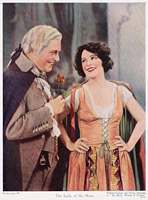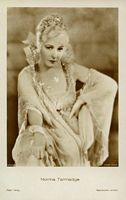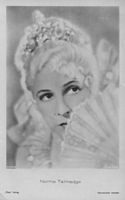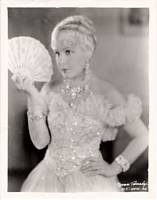

Du Barry, Woman of Passion (1930) Art Cinema Corp./United Artists. Produced by Joseph M. Schenck. Directed and adapted by Sam Taylor. State direction by Earle Browne. Photography by Oliver Marsh. Art direction by William Cameron Menzies and Park French. Edited by Allen McNeil. Sound recording by Frank Grenzbach. Assistant director, Walter Mayo. Production manager, Orville O. Dull. Cast: Norma Talmadge, William Farnum, Conrad Nagel, Hobart Bosworth, Ullrich Haupt, Allison Skipworth, E. Alyn Warren, Edgar Norton, Edwin Maxwell, Henry Kolker. 10 reels, sound. This film is available on video and has been shown on television. The Library of Congress is reported to have a copy (unconfirmed)
| A color picture (possibly from a book) courtesy of Derek Boothroyd. (click on the thumbnail for a larger view) |  |
 |
A rather modern-looking Du Barry. Thanks to Cleo in Luxembourg for this photo. (click on the thumbnail for a larger view) |
| A heavily retouched Ross Verlag postcard. Thanks to Cleo in Luxembourg for this photo. (click on the thumbnail for a larger view) |  |
 |
A nice photo courtesy of Derek Boothroyd. (click on the thumbnail for a larger view) |
United Artists production and release. Starring Norma Talmadge. Based on the play of the same name by David Belasco. Directed by Sam Taylor. At Rivoli, New York, beginning Oct. 31, indef. Running time, 88 minutes.
Jeanette Vaubernier (Mme Du Barry) |
Norma Talmadge |
| Louis XV | William Farnum |
| Cosse de Brissac | Hobart Bosworth |
| Duc de Brissac | Conrad Nagel |
| Jean Du Barry | Ulrich Haupt |
| La Courdan | Allison Skipworth |
| Denys | E. Alyn Warren |
| Renal | Edgar Norton |
| Maupeou | Edwin Maxwell |
| D'Alguillon | Henry Kolker |
Maybe Du Barry was a girl who meant "no" when she said "yes," but this film would hardly make customers believe it. That's a new angle on the historical paramour and on rather a modern tangent with some modernistic flavor. It's not good enough to attract b.o. Wholly unimpressive. If intended as a spectacle of a costume period this picture, punctuated with a sexy appendage to its title, might stay as long as that title attracts the women, if it does, with Norma Talmadge. It's nix for kids and the sticks.
Miss Talmadge speaks, but her voice has no flexibility. Her grimaces are monotype--not so good. She abounds in closeups. Additionally its modern dialog and sex twister gets handicapped by being costume and of lethargic pace. None of the acting, except Hobart Bosworth, is truly as pompous as might be expected.
Some morbid imagination could lure exploitation adjectives from a dictionary, but the film won't back them up The story is of a disconnected type and right off gives the customers a setback to be suspicious of the entertainment by having a foreword prefixed. This foreword suggests that the film is not intended to convey any historical accuracy. Considering that it's about an historical period and actual personages who lived then that's illogical b.o.
Seemingly the studio tried to overbuild, and didn't do either the cast or Miss Talmadge any good. The histrionics are overloaded with misdirected enthusiasm. Most of the acting is on the imaginative, seemingly, rather than screened. When the customers must try to figure a film story instead of the reverse, it's k.o. not o.k. Stuff goes melo too often to be realistic.
Doing a Du Barry that's familiar to adults of any generation almost since the woman lived is a task for any actress. Latter must equal at least the imaginative curiosity of her audience. Neither the direction nor Miss Talmadge seems to have visualized anything like that.
It might be minor, but the dialog, being so thoroughly American, seems almost sacrilegious, and the French accents are variable in every character.
A series of incidents begin with a soldier finding the girl milliner in a pond. With most of actual romance in the dialog, the girl is next a hostess in a gambling house. From there she jumps in an unconvincing way to become the king's mistress.
It ends cuckoo for the b.o. Often when trying to be serious it is just travesty. Both Du Barry and her lover do a fadeout in double death. That happened after a most belabored chain of closeups that left little of the spectacle part to be seen except marching soldiers. Even the fete in the king's garden and a couple of mob scenes are in closeup.
That Du Barry must have been subtley alluring and not so physically prominent seemingly never got to the makers. There is a full 60 minutes of useless melo romance between Miss Talmadge and Conrad Nagel before anything like some action is shown.
"Du Barry--Woman of Passion" (U.A.) Norma Talmadge in unimpressive and unconvincing picture wholly depending on title for any b.o. draw.
DU BARRY--WOMAN OF PASSION--United Artists
Here is the sad spectacle of a story that suggests fire and thunder, and a picture that has neither. Norma Talmadge, as the milliner who became a king's favorite, shows a hint of her old-time vitality now and then, but gives up in the fight against long, artificial speeches. Conrad Nagel plays his usual romantic role. But William Farnum gives a robust and excellent performance.
Talking in the Talkies
Classic's reviews by Laurence Reid
DuBarry [omitted, picture of Talmadge and Farnum]
Norma Talmadge, sparkling star of silent days, resumes her rightful place upon the screen in this, her first real chance in the talkies. The picture, whose title carries the appendage "Woman of Passion," is a slow-moving costume drama of the French court in the days of Louis XV. It is a beautiful and costly production. But it somehow fails to stimulate great interest other than that provided by Norma and the come-back of William Farnum as France's frivolous monarch.
The story, an old-timer now, and tiresome, follows the career of Madame Dubarry: Norma is every inch the star. The old favorite, William Farnum, is an impressive king.
Last revised, November 30. 2008